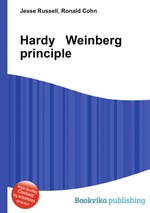Hardy Weinberg principle
Jesse Russell Ronald Cohn
бумажная книга
High Quality Content by WIKIPEDIA articles! The Hardy–Weinberg principle (also known by a variety of names: HWP, Hardy–Weinberg equilibrium, Hardy–Weinberg Theorem, HWE, or Hardy–Weinberg law) states that both allele and genotype frequencies in a population remain constant—that is, they are in equilibrium—from generation to generation unless specific disturbing influences are introduced. Those disturbing influences include non-random mating, mutations, selection, limited population size, "overlapping generations", random genetic drift, gene flow and meiotic drive. It is important to understand that outside the lab, one or more of these "disturbing influences" are always in effect. That is, Hardy–Weinberg equilibrium is impossible in nature. Genetic equilibrium is an ideal state that provides a baseline against which to measure change.


